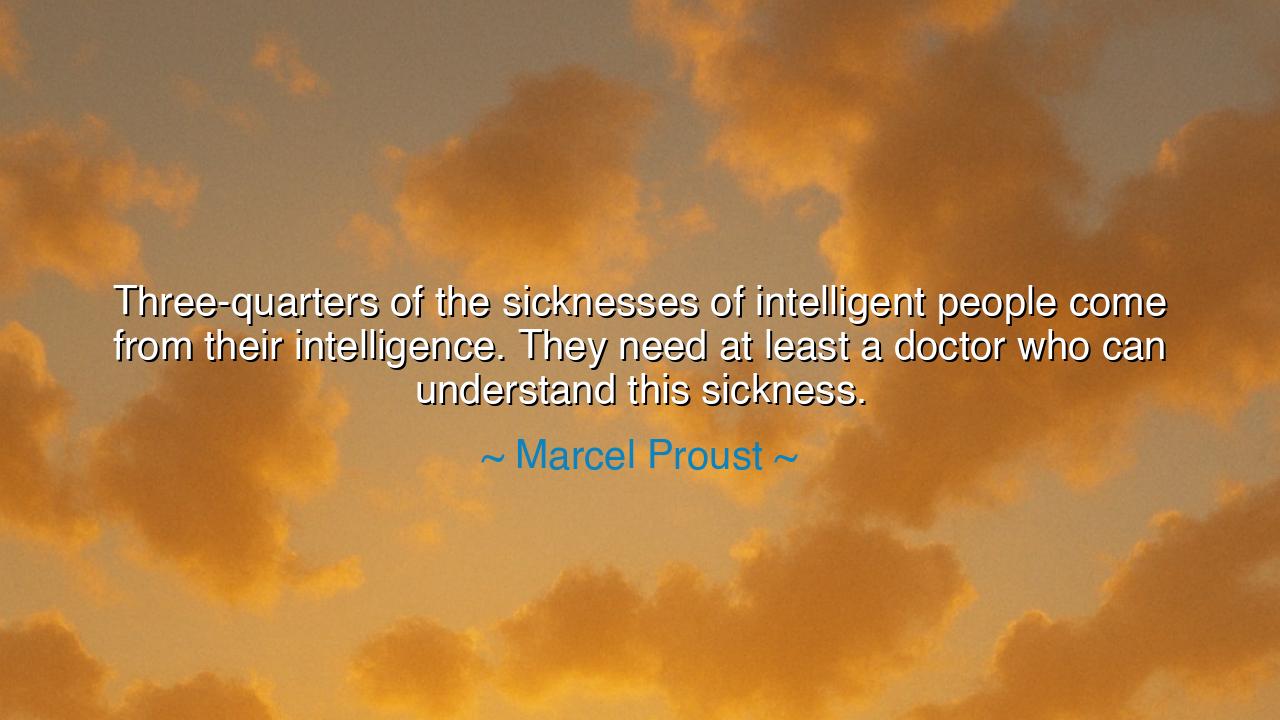
Three-quarters of the sicknesses of intelligent people come from
Three-quarters of the sicknesses of intelligent people come from their intelligence. They need at least a doctor who can understand this sickness.






“Three-quarters of the sicknesses of intelligent people come from their intelligence. They need at least a doctor who can understand this sickness.” – Marcel Proust
There is a strange and quiet sorrow that dwells in the minds of the wise. Marcel Proust, that sensitive voyager of the soul, once spoke these words not in jest, but in deep recognition of a truth hidden beneath the surface of human brilliance. Intelligence, he knew, is both a light and a burden. It allows man to see more clearly — but what he sees may wound him. The sickness of intelligent people is not of the body but of the spirit; it is the fever of those who think too deeply, who feel too keenly, who stand too long gazing into the abyss of meaning. Such men and women fall ill not from weakness, but from the very excess of awareness that separates them from the tranquil ignorance of others.
In the ancient world, the philosophers of Greece knew this ailment well. Socrates, who spent his life questioning the nature of virtue, knowledge, and the self, confessed that “the unexamined life is not worth living.” Yet in that very examination lay a torment — for to seek truth is to disturb comfort. The mind that sees too much cannot rest, for it perceives not only beauty but also the tragedy beneath it. Socrates’ endless inquiries made him both the wisest and most condemned of men; in the end, he drank the hemlock rather than renounce the clarity that had isolated him. His was the fate of many thinkers: to bear the heavy crown of consciousness, which glitters with knowledge but presses hard upon the brow.
To say that intelligence causes sickness is not to scorn wisdom, but to acknowledge the toll it takes. The intelligent are often haunted by possibilities, by the memory of past wrongs, by visions of futures that may never come. Their minds, sharp as swords, turn inward and cut their own peace to pieces. The poet suffers for the beauty he cannot reach; the scientist for the limits he cannot break; the philosopher for the truths that offer no comfort. Even in our modern age, where knowledge reigns supreme, the ailments of the mind — anxiety, melancholy, despair — afflict most those who think the most. Thus Proust, whose genius was born of delicate perception, wrote as one who had felt this sickness within himself, a sickness no ordinary doctor could cure, for it sprang from the intellect, not the flesh.
Consider the life of Vincent van Gogh, a soul ablaze with vision. He saw colors where others saw gray, felt eternity in the curve of a sunflower, divinity in a field of wheat. But this very depth of perception, this endless searching for meaning, tore his spirit apart. The world could not understand his fevered beauty, nor could he silence the storm within. His art became both cure and wound. Each stroke of the brush released his soul and deepened his agony. He, too, needed a “doctor who could understand this sickness” — one who could heal not the body, but the overburdened heart of a man who saw too much and felt too deeply.
Yet we must not pity the intelligent as cursed, but understand them as guardians of perception. Their suffering, though sharp, is sacred. It is from their unrest that progress arises, from their doubt that discovery blooms. The sickness of the intelligent is the price of illumination. They are tormented by the contradictions of life — love and death, joy and sorrow, creation and decay — yet it is their willingness to face these contradictions that gives birth to art, to philosophy, to the very wisdom that guides humanity through the dark. The fire that burns them also lights the world.
The lesson, then, is not to flee from intelligence, but to learn balance. He who thinks deeply must also rest deeply; she who questions must also learn to dwell in silence. There must be time for stillness, for the body to soothe what the mind unsettles. As Proust himself sought refuge in the act of writing, so too must every seeker find their sanctuary — whether in nature, in art, in prayer, or in companionship. The cure for the sickness of intelligence is not ignorance, but understanding — a gentle acceptance that the mind’s storms are part of the price we pay for insight.
So let these words be a counsel to the generations that follow: think deeply, but live gently. Do not let your brilliance become your burden. When your mind grows heavy with knowledge, seek the medicine of simplicity — the laughter of friends, the song of the wind, the warmth of rest. For intelligence, like fire, must be tended wisely: too weak, it dies; too wild, it consumes. The wise do not extinguish the flame — they learn to live in its light.






AAdministratorAdministrator
Welcome, honored guests. Please leave a comment, we will respond soon